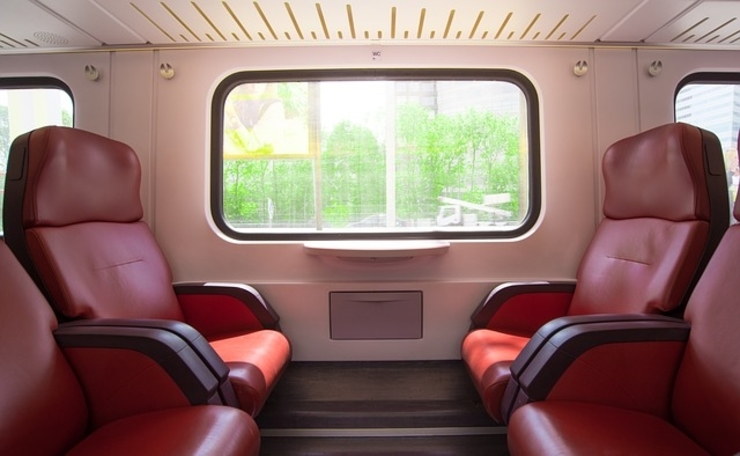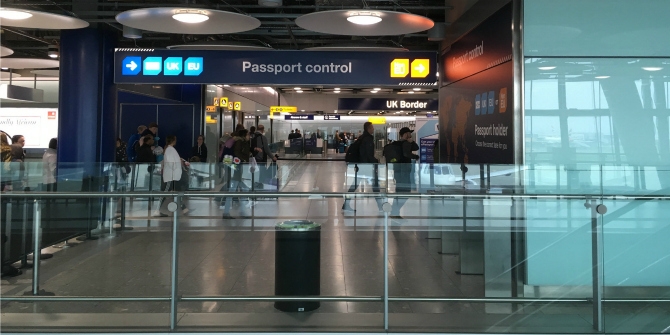Responding to Jürgen Gerhards’ post on the ecological damage being done by excessive academic travel, Race MoChridhe observes how the financial and social burdens of academic travel add an additional barrier to participation in research and argues that if academia wants to address issues of diversity and equity in research, it must first acknowledge the effects of academic travel culture.
In a recent post, Jürgen Gerhards outlined four steps for reducing academic air travel, citing the substantial carbon footprint of academic conference and committee globe-trotting. All of his recommendations could stand readily on this point alone. Environmental protection is far from the only reason to critically re-evaluate academic travel culture, however. First as an independent scholar working in K–12 education, and now as a library worker amidst staff often treated as peripheral to the production of new research (despite solid evidence to the contrary), I have had many occasions to experience first hand the systemic barriers that exclude good scholars from the mainstream of scholarly communication. In a recent essay for the Journal of Academic Librarianship, I examined how the costs of “literacy brokering” for non-native English speakers often exceed the costs of article processing charges (APCs), much more widely acknowledged (and condemned) as exclusionary. In precisely the same fashion, the cost (in travel, lodging, etc.) of presenting at a conference can easily exceed the €1,485 average APC cost.
Many contingent faculty, librarians, and others end up frozen out of conference participation, just as they are out of gold open access, and the result is not just to inhibit academic careers, but to impair research. As slow scholarship advocates note, good research takes time to mature amidst feedback and refinement. When travel costs are prohibitive, and especially, when they are in direct competition with budgeting for APCs (which have a higher return on investment for building a CV), the incentive is for research to move directly from concept through to journal submission without the opportunities for incremental critique that conferences are meant to offer. Reducing the cost of participation not only fosters greater socioeconomic and professional diversity, but also deepens academic discourse and improves the quality of published research.
Yet, it would be a mistake to think that the challenges of academic travel culture can be addressed simply through giving more grants. Travel weighs heavily, for reasons quite apart from finances, on parents of small children and caregivers for aging relatives. I belonged to this latter category until recently and still belong to the former. When an internship with an academic publisher required me to go out of town for three days to meet with editorial boards, it took its toll on my wife, who had to assume the burden of my usual household responsibilities and the entirety of childcare in my absence without family support (since, like most academic families, we are geographically displaced by job migrancy). So short a time might seem a small inconvenience, but it came in the context of my regular 60+ hour work weeks at three jobs and my last semester of library school, while my wife was working another 20 hours outside the home to save money for moving to my next job once my degree was finished. This is not an unusual story among the academic precariat, and within that setting the stress that three days’ absence can place on a spouse, a child, and a marriage is significant. Multiplying that times the conference schedule that serious career advancement demands quickly becomes unthinkable.
These burdens fall primarily upon women because, whether they are the wives of academics or are academics themselves, they are far more likely to be primary caregivers for relatives of all kinds (including their own children) and are generally responsible for a far greater share of the other domestic work that keeps a household together. When we tie professional advancement in the academy to participation in conferences and on committees that require extensive travel, we are too often asking for what is simply impossible to give, either in terms of their own time or of a spouse’s. This is an arrangement that disproportionately favors those without family commitments, which is much more likely to mean men. Just as there is a certain degree of myopia, if not outright hypocrisy, in our collective professional agitation for action on climate change, while maintaining our jet-set lifestyle, so too the continued reliance on conference and committee travel in the digital age discredits our claims to desiring greater gender equity.
Whilst time and money (or the lack thereof) have caused me to scroll sadly away from conference calls for papers that I otherwise would have loved to contribute to, I am conscious that there are a wide range of other voices pushed to the margins by the demands of travel. I think of colleagues experiencing chronic illness or disability. I think of researchers whose travel schedules are limited by religious practices, either through explicit schedule conflicts with observances or through inability to sacrifice so much time away from family and local community service. I think of scholars facing travel bans like those currently enacted by the United States, or scholars being punitively denied passports by their own governments, or scholars living undocumented in host countries they don’t dare to leave.
Meeting with others face-to-face has real value and there are times when there is no substitute. Still, modern technology is increasingly a suitable substitute for many common exchanges of ideas. Videoconferencing and other virtual tools for collaboration can make the Earth greener, as Gerhards noted, but they can also make the academy fairer and more representative of the Earth’s inhabitants by means as simple as offering an option for virtual participation alongside the choice for physical attendance.
If we want to practice what we preach, whether about the environment or about inclusion, it’s time to start preaching and practicing from the comfort and convenience of our desks.
Image Credit: Free Photos via Pixabay
Note: This article gives the views of the author, and not the position of the LSE Impact Blog, nor of the London School of Economics. Please review our comments policy if you have any concerns on posting a comment below
About the author
Race MoChridhe is a Master of Library and Information Science student at the University of Wisconsin-Milwaukee, an open access publishing intern for the American Theological Library Association, and a technician at the research library of the Minnesota Department of Transportation. His research interests lie in the use of applied linguistics to improve library services, as well as exploration of the intersections between libraries and language policy and planning. He deeply regrets not being able to afford to present more of this work at conferences.










Perhaps when discussing family structures and the sharing of household responsibilities in the future, you could write with more inclusive language. The language you used is heteronormative and cisgender-normative, and does not honor our colleagues who do not identify as cishet.
*buries head in hands*
what exactly is the problem here? The author is a man in a straight couple, talking about his own family, is he supposed to refer to his wife in a gender-neutral way?
And how does pointing out that the burden of domestic work and caregiving falls disproportionately upon women exclude LGBT folks? It’s just a fact. And it applies to LBT women as well, even though domestic work is obviously not divided in a gendered way in lesbian couples, we still have relatives beside our partners… and even within our communities we do most of the care work
All very good points, and true in many careers outside of academia. As a publisher, my travel schedule weighs heavily on my mind as an otherwise environmentally conscious citizen, and also as i look to have a family, and realistically consider that the travel required to obtain serious progression would require sacrifices beyond what i am prepared to offer, and what i can realistically impose on my husband, who works very demanding hours. The costs of that are also not regularly picked up by employers, which also creates financial inequality.
As a side note: one practice that I have endeavoured to introduce across many journals that i manage is a hybrid approach to special issues, which means mandating an open call for papers alongside pre-commissioned work. This is specifically to encourage a greater diversity of voices, as many special issues emerge directly from symposia which are by their very nature exclusionary. This cannot solve the payment of APCs, but does further underscore the sustainability of Green OA as an option for less well funded sectors and countries.
Race, you say “others end up frozen out of conference participation, just as they are out of gold open access, and the result is not just to inhibit academic careers, but to impair research”
Do you have any evidence that conference participation improves research? As an industry, we spend eye-watering amounts of money on conferences, which also come with opportunity cost (you could have spent that week finally finishing your manuscript instead). So you would expect there would therefore be a body of evidence showing that there is a clear benefit for all this expenditure; that it is something we should reasonably be expecting taxpayers or charity donors to pick up the bill for when they give researchers money expecting us to find a cure for cancer or to solve climate change. Is there any evidence you know of showing the benefit?
I agree wholeheartedly James! The time is well overdue to rethink priorities!
Evidence may not be very measurable, but I have experienced many collaborations that started during coffee breaks on conferences. And I am during so-called early career scientist. For a scientist, showing your research and being open for constructive criticism on conference is only one of the goals for the conference. Finding (sometimes by chance) people that could enhance your research by new techniques or andd their own ideas and generally expanding your social-academic network is probably the most important part of conferences. By the way I don’t know, how e-participation can can substitute for that.
https://onlinelibrary.wiley.com/doi/full/10.1111/ecoj.12566
David, yes, I think there probably are benefits (e.g. finding new collaborations) that accrue from conferences. And that they are hard to measure. But given the huge amounts of money we pump into conferences and that could instead presumably fund several multi-million pound centres for resarch on [name favourite topic here] its just odd that we haven’t done much to evaluate their cost effectiveness.
Ananta, that paper is excellent. A little hard to decypher so apologies in advance if I get it wrong. But it seems that the bottom line is that “76 pairwise collaborations were lost due to the 2012 cancellation [of the APSA meeting].” Ok. But how much did the meeting cost? There were 4,203 authors registered to attend. Standard registration fees are $300ish. That’s $1million straight off. Then there’s 4,000 flights to pay for, 4,000 hotel rooms, opportunity cost (what’s a week’s wages for 4,000 academics come to?). What’s better, using that money for a conference in order to generate 76 papers or using it to fund extra grants for our early career researchers?
There is a lengthy evaluation of “mega conferences” (>2,000 participants) here:
https://www.springer.com/la/book/9783540372233
“Since the late 1990s, megaconferences in the water-related sectors have become regular occurrences. The latest one, in Mexico City, in March 2006, is estimated to have cost a total of $205 million, and had 19,000+ participants […] This book is the first pioneering study to assess the impacts of the megaconferences on water policies, programs and projects at global, regional and national levels. The results are bleak.”
While this article tries to address gender inequality and on the surface attempts to present possible solutions for it, I do have to wonder why the author writes that women “[…] are generally responsible for a far greater share of the other domestic work that keeps a household together.” That is precisely the kind of attitude that keeps us stuck in patriachally defined structures – and that keeps women stuck in antiquated roles.
Maybe a good place to start addressing gender inequalities for the author would be performing a critical inventory of his own attitudes and ideas before attempting to declare that he has found the solution to these issues.
All of the above, plus as a self-funded PhD student I rapidly ran out of resources (and organisations to ask for same) for visiting any but the nearest conferences. It’s no coincidence that my work flourished under lockdown, because I was no longer largely excluded from my academic milieu. How much more must this be true for people from less wealthy countries?
This overlooks the issue that as a woman I was expected to achieve 4* publications in journals largely published in US journals. Relative few US academics travel to UK conferences in my disciple. Therefore travelling was the only way to touch base with the editors of these journals. Yes there are webinars now. However, you rarely get to speak in these. So travelling is the only to be heard & recognised by these people.
I have been trying for a while to work with proxy researchers on the ground in international archives, with varying degrees of success. Some places have great proxy researcher programmes (that also provide a much-needed income stream for e.g. postgrads) – shout out to McMaster here, that has really pioneered this – and virtual reading rooms. Other places are much more resistant. To me it’s a no-brainer: the amount of money I’d spend on travel + accommodation and the sheer logistical headache of organising a trip away from home could be used so much more smartly hiring someone local to take photos for me, let alone the carbon footprint. Why isn’t there more of this?